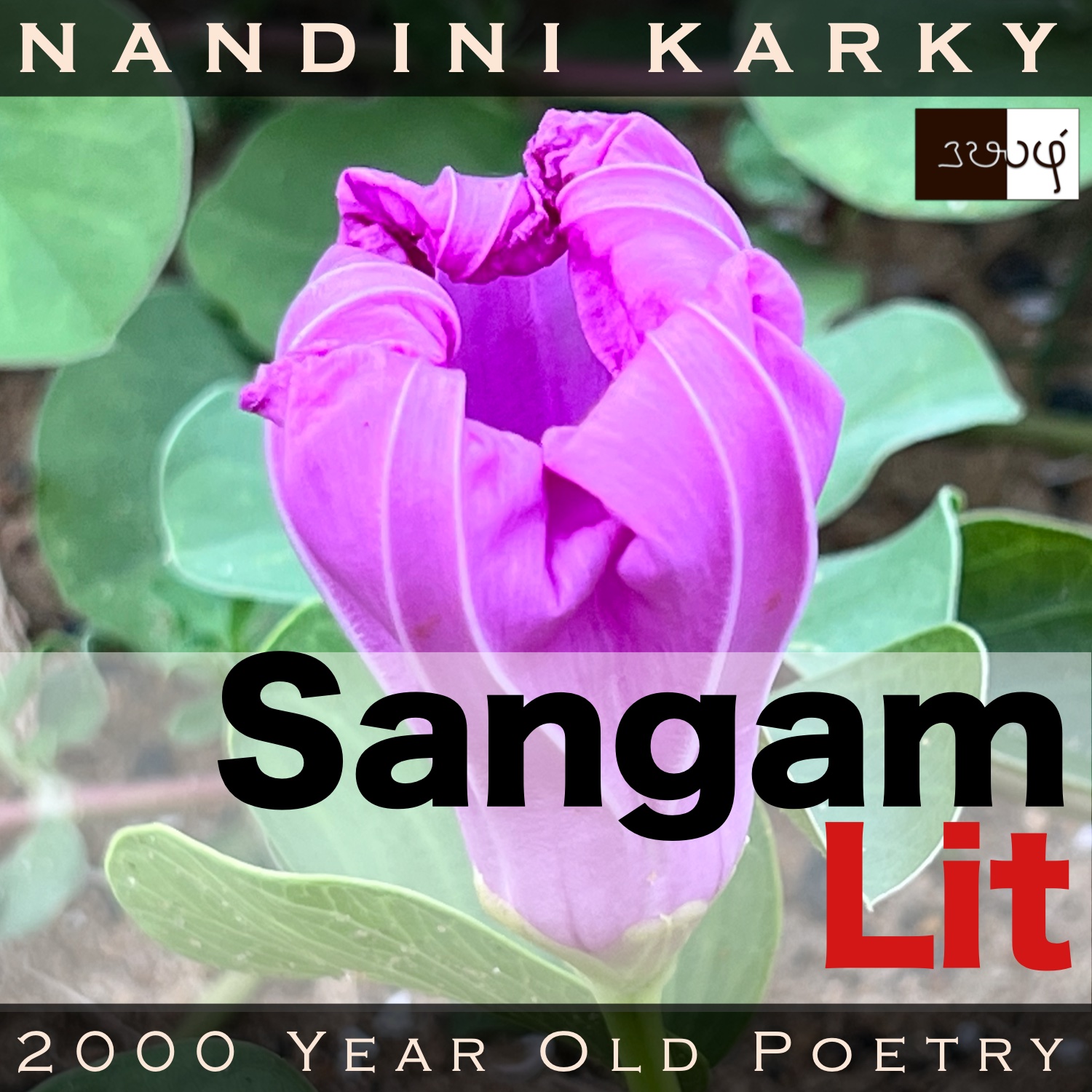Podcast: Play in new window | Download
Subscribe: Apple Podcasts | Spotify | Amazon Music | Android | iHeartRadio | Email | TuneIn | RSS | More

In this episode, we perceive an intricate response to words of advice, as portrayed in Sangam Literary work, Kurunthogai 243, penned by Nambi Kuttuvanaar. The verse is situated in the coastal regions of ‘Neythal’ and speaks in the voice of the lady to the confidante, replying to the confidante’s words that the lady must bear with the man’s parting.
மான் அடி அன்ன கவட்டிலை அடும்பின்
தார் மணி அன்ன ஒண் பூக் கொழுதி,
ஒண் தொடி மகளிர் வண்டல் அயரும்
புள் இமிழ் பெருங் கடற் சேர்ப்பனை
உள்ளேன்-தோழி!-படீஇயர், என் கண்ணே.
‘Forced open’ is the core thought of this verse. The opening words ‘மான் அடி அன்ன கவட்டிலை அடும்பு’ meaning ‘the split leaf of a beach morning glory that looks like a deer’s hoof’ is a classic instance of plant-animal similes that Sangam poets are adept at. ‘ஒண் பூ’ talks about ‘the radiance of a flower’. This is followed by a verb ‘கொழுதி’ meaning ‘tear open’, which single-handedly supports the entire concept of this song. ‘Young maiden wearing glowing bangles’ are back at what they do best, which is ‘playing games on the shore’ as mentioned in ‘ஒண் தொடி மகளிர் வண்டல் அயரும்’. Ending with the words ‘உள்ளேன் தோழி! படீஇயர், என் கண்ணே’ meaning ‘I shall think not, my friend! Let my eyes sleep’, the verse evokes our empathy.
On one side, maiden are delighting in leisurely games whereas the lady is pining with sleeplessness. The context reveals that the man and lady were leading a love relationship when the man parted away to gather wealth for their wedding. The lady languished in his absence and started to lose her health. Seeing this, the confidante advises the lady that she must bear better with the man’s separation. To the confidante, the lady says, “Like a deer’s hoof is the cloven leaf of an ‘adumbu’ plant, whose luminous flowers, looking like bells on a horse’s garland, are plucked and forced open by maiden wearing radiant bangles, for their games, in the vast shores of the lord, resounding with bird calls. I shall not think of him, my friend, and so, let them find rest – these eyes of mine!” With these words, the lady conveys the impossibility of bearing with the man’s parting in a unique response.
Time to explore the nuances. The lady starts by pointing to a leaf of a beach morning glory plant and describes how so like a deer’s cloven hoof it is. Incidentally, one of the other common names of this plant is ‘goat’s foot’! Someone from another culture, who speaks a different language, from a different time, has looked at this leaf and thought the same thoughts as this Sangam poet. Testimony to the interconnected web that flows from human minds across space and time! Returning, the lady has been talking of this plant, only to call our attention to its purple flowers, which she equates to the bells on a horse’s garland, and describes how these flowers are plucked and forced open by young maiden, playing ‘vandal’ games on the beaches of the man’s land. Describing the man’s domain so, the lady concludes with the statement that she has decided not to think about the man, and so, for sure, her eyes will sleep and give her the rest she needs.
Deciding to not think about the man, is it? No chance the lady is going to have any luck with that, for thinking about not thinking of a person is an unsolvable paradox, is it not? That’s what the lady implies here, that it’s impossible for her not to think of her man, and consequently, impossible to sleep as well. Even before she makes these statements, in the image of the maiden forcing open the ‘adumbu’ flower, just for their games, she puts in a metaphor for how the confidante seems to be forcing the lady to put on a brave face for the sake of others. An exquisite way of flashing a flower being forced to tell how the lady feels on hearing those words of advice from her friend. A verse that seems to whisper saying, when you see a friend in pain, do not always jump in to offer, what you think as, practical solutions, but instead, with them, just be and see!




Share your thoughts...